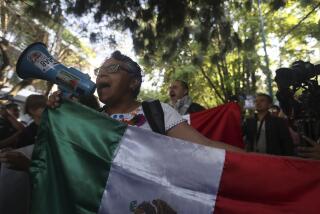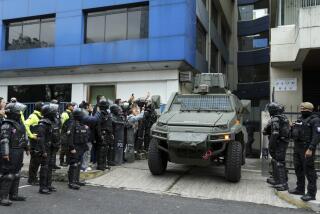Colombia to pay Ecuador $15 million to settle coca herbicide suit
QUITO, Ecuador — Colombia has agreed to pay $15 million to settle a lawsuit filed by Ecuador for human and economic damage caused by spraying an anti-coca herbicide that blew across the countries’ common border.
The settlement of the 2008 lawsuit brought by Ecuador before the International Court of Justice at The Hague was announced by both governments Friday. In a statement, Colombia’s Foreign Ministry said the “friendly agreement” included money to encourage economic development in Ecuador’s border zone.
“The peaceful solution demonstrates the excellent relations shared by the two countries, the fruit of continuous effort and … the 160 projects that feed the binational agenda,” said the Colombian statement.
By Monday, however, the agreement was being criticized by some prominent Ecuadoreans.
National Assembly member Clever Jimenez, who sits on the congressional international relations commission, said $15 million is “insufficient” compensation for the health consequences suffered by hundreds of farmers in northern Ecuador who ingested airborne glyphosate, the active ingredient in Roundup weed killer.
The U.S. Environmental Protection Agency has issued warnings that long-erm exposure to glyphosate could cause “kidney damage (and) reproductive effects.”
“The complaint at The Hague established a precedent insofar as the respect that two countries should have for one another,” Jimenez said in an interview. “The spraying left many farmers with skin problems, in addition to destroying hundreds of acres of crops.”
Alberto Molina, a former Ecuadorean army officer now working as a security consultant in Quito, said the two governments should continue to assess the effect on his country of Colombia’s drug war and five decades of civil conflict, including the thousands of Colombian refugees now living in Ecuador.
“This has a cost for the Ecuadorean government which our neighbor has not totally taken responsibility for,” Molina said.
Each year, Colombian and U.S. pilots in Colombia spray the herbicide on hundreds of thousands of acres of suspected crops of coca, the raw material for cocaine, to try to impede production of the drug.
Up until 2008, the chemical was sprayed directly up to the border separating the two countries. After Ecuador filed the lawsuit claiming the wind was carrying the herbicide across the border, Colombia agreed to suspend all spraying within six miles of the border, a ban still in effect.
The two countries nearly went to war in March 2008 after then-Colombian President Alvaro Uribe authorized a brief invasion by army commandos to kill Raul Reyes, the second-highest official of the FARC, Colombia’s largest rebel group, who had taken refuge in northern Ecuador.
Although tensions have since eased considerably, Ecuador complains that Colombia inadequately guards its southern border, allowing guerrillas to flee there for rest and recuperation and to cause mischief.
On Aug. 8, the Ecuadorean army killed five suspected FARC rebels and captured two others in the northeastern province of Sucumbios. One Ecuadorean soldier was killed in the confrontation.
Special correspondents Jaramillo Viteri and Kraul reported from Quito and Bogota respectively.
ALSO:
Capsized Costa Concordia slowly being righted
Egyptian security forces storm community held by Morsi supporters
U.N.: Syrian chemical attack ‘unequivocally and objectively’ confirmed
Special correspondents Viteri reported from Quito and Kraul from Bogota.
More to Read
Start your day right
Sign up for Essential California for news, features and recommendations from the L.A. Times and beyond in your inbox six days a week.
You may occasionally receive promotional content from the Los Angeles Times.






